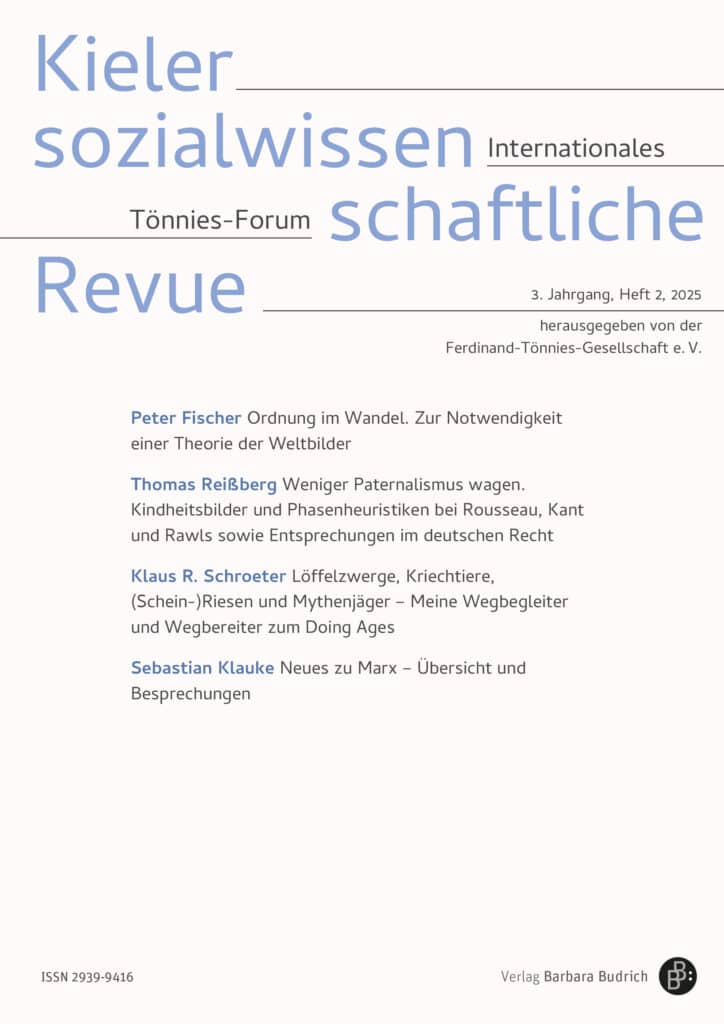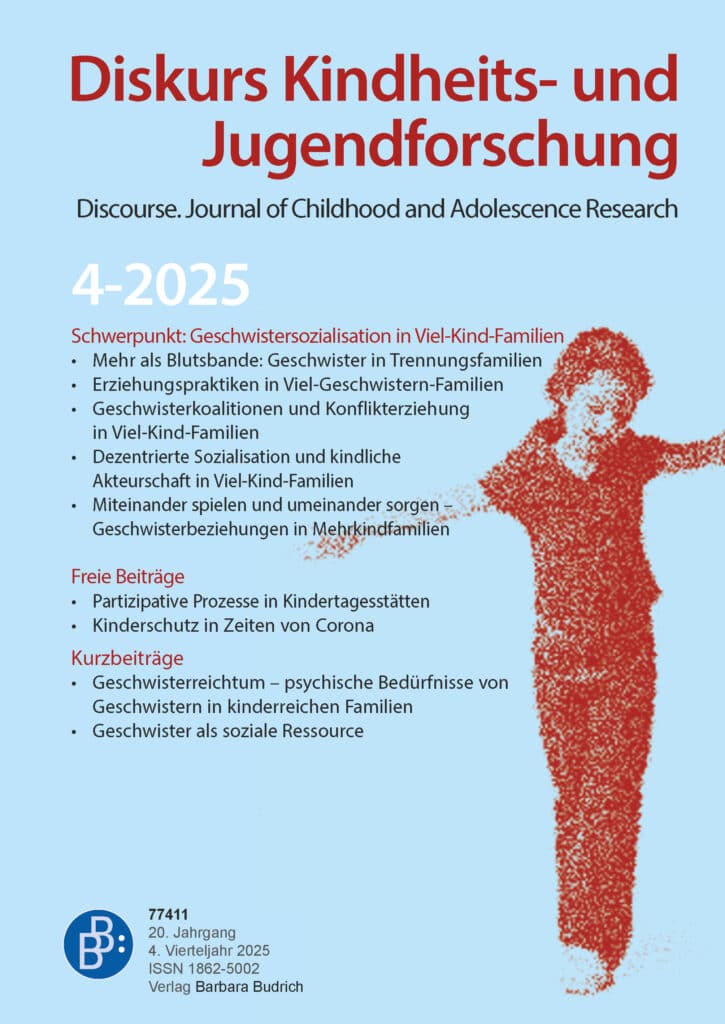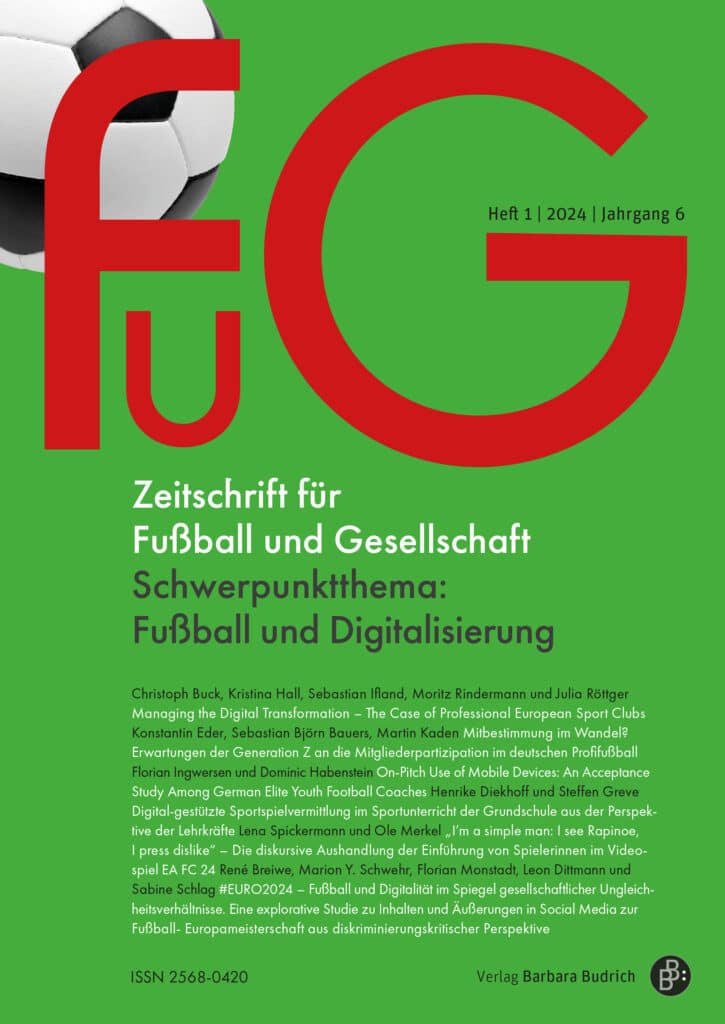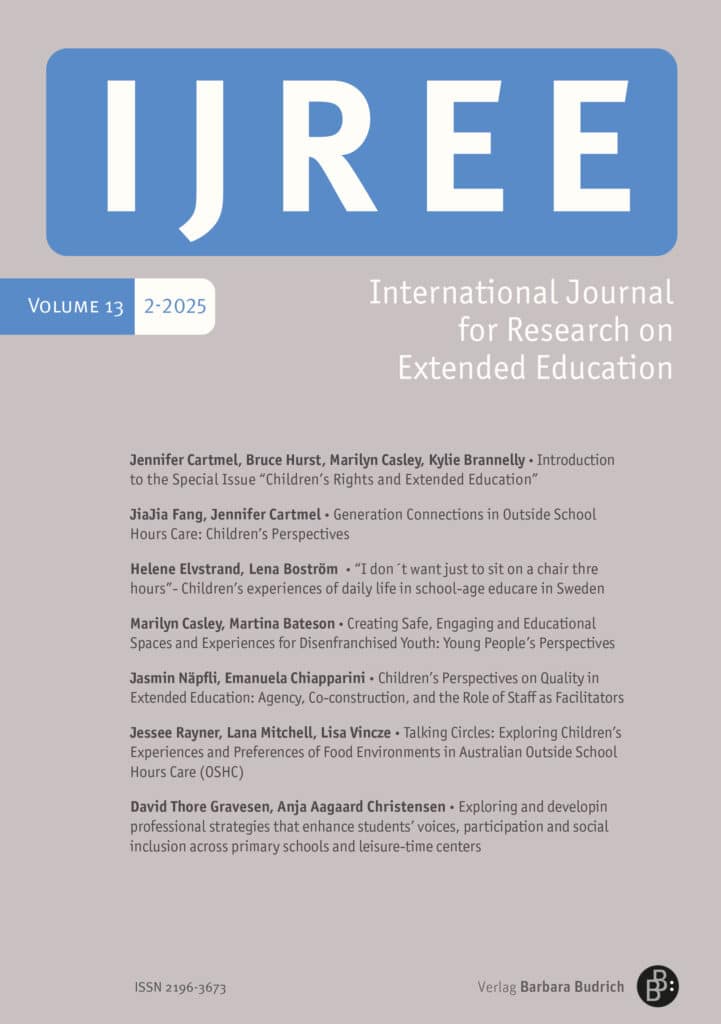Informationen zur Zeitschrift
Home » Publications » PCS 1+2-2018 | Free Contributions
PCS 1+2-2018 | Free Contributions
Erscheinungsdatum : 19.07.2021
84,00 €
Inhalt
PCS – Politics, Culture and Socialization
1+2-2018: Free Contributions
Articles
Ganna Diedkova / Christ’l De Landtsheer: Going negative by metaphors: The Donbass conflict in the Russian and the Ukrainian Press
Richard D. Anderson Jr.: The Colonialist Roots of Democratic Decay: Collective Action, Experimental Psychology, and Spatial Discourse
Elena Shestopal: The Image of Russia in Contemporary Russian Society: Political and Psychological Analysis
Arie Geronik: The Influence of Early Childhood Socialization on Political Decision Making in Adulthood: Benyamin Netanyahu’s Potential to Become a Peacemaker
Book Reviews
Jessica Jansen: New Right, By Ico Maly (2018)
Marie Blanche de Posch: Face-to-face diplomacy social neuroscience and international relations, By Marcus Holmes (2018)
Maud Peeters: For a Left Populism, By Chantal Mouffe (2018)
Lotte Daens: Emotions, Media and Politics, By Karin Wahl-Jorgensen (2019)
Natacha Waldmann: Mothers, Daughters and Political Socialization ‒ Two Generations at an American Women’s College, By Krista Jenkins (2013)
Download of Table of Contents / Inhaltsverzeichnis herunterladen
Extracts / Leseproben
Download of single articles (Open Access/fee-based): pcs.budrich-journals.com
You can register here for the PCS alert.
Einzelbeitrag-Download (Open Access/Gebühr): pcs.budrich-journals.com
Sie können sich hier für den PCS-Alert anmelden.
Zusätzliche Informationen
| Publisher | |
|---|---|
| ISSN | 1866-3427 |
| eISSN | 2196-1417 |
| Volume | 9. Jahrgang 2018 |
| Edition | 1+2 |
| Date of publication | 19.07.2021 |
| Scope | 112 |
| Language | Englisch |
| Format | 17 x 24 cm |
| DOI | https//doi.org/10.3224/pcs.v9i1-2 |
| Homepage |
Autor*innen
Keywordscollective action, colonialism, conflict, country’s image, democracy, dictatorship, discourse, discourse analysis, Donbass, Family, Foreign policy, Framing, identity, image of authority, international relations, news media, political context of perception, political leadership, political perception, Political psychology, Russia, Ukraine
Abstracts
Going negative by metaphors: The Donbass conflict in the Russian and the Ukrainian press (Ganna Diedkova & Christ’l De Landtsheer)
Previous research has established the importance of metaphors as conceptual devices (Semino, 2008; Zinken & Musolff, 2009). This article builds upon existing research and extends the insight into how media use metaphors in their coverage of military conflicts. The media coverage of the ongoing Eastern Ukrainian military conflict (Donbass conflict) presents a suitable case for this investigation. The strength of this study lies in the nature of the data that have been collected, namely articles that appeared in a Russian and a Ukrainian news outlet (September 2014 until January 2015) covering the same stories (same date, same event). Thereby, we investigate metaphor as a conceptual device and an element of framing that contributes to the distinct representation of the conflict in the selected outlets from the two countries. This research follows a qualitative research design, relying on Critical Metaphor Analysis (Charteris-Black, 2004), and Metaphor Power Taxonomy (De Landtsheer, 2015; Beer & De Landtsheer, 2004). We conclude that the selected Russian and Ukrainian media used metaphors for enemy construction, in particular the hostile imagery with “Colony” (Russian outlet) and “Fear” (Ukrainian outlet) as major source domains. Keywords: discourse analysis, metaphor, framing, news media, Russia, Ukraine, Donbass, conflict
» Buy Single Contribution (Budrich Journals) / Einzelbeitrag kaufen (Budrich Journals)
The Colonialist Roots of Democratic Decay: Collective Action, Experimental Psychology, and Spatial Discourse (Richard D. Anderson, Jr.)
Democracy and dictatorship both depend on collective action, which humans avoid because it takes more effort than it is worth. Experimental psychology reveals that positive spatial discourse, explicit or implicit, reduces the effort that humans project a task to require. If so, dictatorships arise because explicit positive spatial cues, capable of retaining coherence only if assigning only to relatively few members of any population, generate the collective repression by a minority that establishes any dictatorship. Conversely the implicit cue to group size in a color metaphor, capable of assigning throughout a population, generates the universal franchise establishing a democracy. By supplementing spatial cues dividing Europeans with a metaphor of whiteness unifying Europeans and their settlers, colonialism made democracy possible once European withdrawal ended white dictatorship over colonial territories. But by erasing the condition that once secured the universal franchise among Europeans and their settlers, loss of colonies invigorates whites’ fears that hard-won political rights have reverted to insecurity. That insecurity is responsible for the democratic decay now evident across Europe and its settler territories. Keywords: collective action, discourse, democracy, dictatorship, colonialism
» Buy Single Contribution (Budrich Journals) / Einzelbeitrag kaufen (Budrich Journals)
The Image of Russia in Contemporary Russian Society: Political and Psychological Analysis (Elena Shestopal)
The article is based on the results of a study of Russian citizens’ perception of their country. More than 500 in-depth interview and nearly the same number of projective tests from 15 Russian regions became the basis for political-psychological analysis. These data enabled to identify the core features of Russia’s image in Russian mentality. This image includes reflections of authorities, leaders, the population, territory and the international role of the country in the country’s perception. The results confirm the conclusion that territorial expansionism is not typical for Russians. Authorities’ perception is an important component of the country’s image. Citizens‘ mistrust to the state was revealed. This allows us to suggest that Russian society still has not overcome the negative processes that started in the 1980s and led to a serious complex of “national inferiority” in the post-Soviet period. Keywords: political perception, country’s image; image of authority, political context of perception, identity
» Buy Single Contribution (Budrich Journals) / Einzelbeitrag kaufen (Budrich Journals)
The Influence of Early Childhood Socialization on Political Decision Making in Adulthood: Benyamin Netanyahu’s Potential to Become a Peacemaker (Arie Geronik)
This paper examines Benyamin Netanyahu’s potential to reject his current ‘hawkish’ views and to become a peace maker during his fifth (and probably last) term in office as the Prime Minister of Israel. Netanyahu continues to live in the shadow of the legacy of two deceased family members: his older brother Yonatan and his father Benzion. His brother Yonatan was killed in action in 1976 while leading his troops in the renowned counter-terrorism rescue mission ‘Operation Entebbe’. As a result, Yonatan became an Israeli national hero. His father Benzion, who worked as a prominent Israeli historian for decades but was rejected by the Israeli academic and political mainstream due to his ‘hawkish’ views, died in 2012 at the age of 102. It is my assumption that Netanyahu’s political activity up to the present has stemmed in part from his emotional hunger resulting from his need to measure up to the ‘larger than life’ images of his father and brother. The fact that both influential figures are deceased may now enable him to give greater expression to the more pragmatic sides of his personality in the future, and to enter history books – on his own – as a peacemaker. Keywords: family, foreign policy, international relations, political leadership, political psychology
» Buy Single Contribution (Budrich Journals) / Einzelbeitrag kaufen (Budrich Journals)
Inhalt
Inhalt
PCS – Politics, Culture and Socialization
1+2-2018: Free Contributions
Articles
Ganna Diedkova / Christ’l De Landtsheer: Going negative by metaphors: The Donbass conflict in the Russian and the Ukrainian Press
Richard D. Anderson Jr.: The Colonialist Roots of Democratic Decay: Collective Action, Experimental Psychology, and Spatial Discourse
Elena Shestopal: The Image of Russia in Contemporary Russian Society: Political and Psychological Analysis
Arie Geronik: The Influence of Early Childhood Socialization on Political Decision Making in Adulthood: Benyamin Netanyahu’s Potential to Become a Peacemaker
Book Reviews
Jessica Jansen: New Right, By Ico Maly (2018)
Marie Blanche de Posch: Face-to-face diplomacy social neuroscience and international relations, By Marcus Holmes (2018)
Maud Peeters: For a Left Populism, By Chantal Mouffe (2018)
Lotte Daens: Emotions, Media and Politics, By Karin Wahl-Jorgensen (2019)
Natacha Waldmann: Mothers, Daughters and Political Socialization ‒ Two Generations at an American Women’s College, By Krista Jenkins (2013)
Download of Table of Contents / Inhaltsverzeichnis herunterladen
Extracts / Leseproben
Download of single articles (Open Access/fee-based): pcs.budrich-journals.com
You can register here for the PCS alert.
Einzelbeitrag-Download (Open Access/Gebühr): pcs.budrich-journals.com
Sie können sich hier für den PCS-Alert anmelden.
Bibliography
Zusätzliche Informationen
| Publisher | |
|---|---|
| ISSN | 1866-3427 |
| eISSN | 2196-1417 |
| Volume | 9. Jahrgang 2018 |
| Edition | 1+2 |
| Date of publication | 19.07.2021 |
| Scope | 112 |
| Language | Englisch |
| Format | 17 x 24 cm |
| DOI | https//doi.org/10.3224/pcs.v9i1-2 |
| Homepage |
Produktsicherheit
Bewertungen (0)
Bewertungen
Es gibt noch keine Bewertungen.
Authors
Autor*innen
Tags
Keywordscollective action, colonialism, conflict, country’s image, democracy, dictatorship, discourse, discourse analysis, Donbass, Family, Foreign policy, Framing, identity, image of authority, international relations, news media, political context of perception, political leadership, political perception, Political psychology, Russia, Ukraine
Abstracts
Abstracts
Going negative by metaphors: The Donbass conflict in the Russian and the Ukrainian press (Ganna Diedkova & Christ’l De Landtsheer)
Previous research has established the importance of metaphors as conceptual devices (Semino, 2008; Zinken & Musolff, 2009). This article builds upon existing research and extends the insight into how media use metaphors in their coverage of military conflicts. The media coverage of the ongoing Eastern Ukrainian military conflict (Donbass conflict) presents a suitable case for this investigation. The strength of this study lies in the nature of the data that have been collected, namely articles that appeared in a Russian and a Ukrainian news outlet (September 2014 until January 2015) covering the same stories (same date, same event). Thereby, we investigate metaphor as a conceptual device and an element of framing that contributes to the distinct representation of the conflict in the selected outlets from the two countries. This research follows a qualitative research design, relying on Critical Metaphor Analysis (Charteris-Black, 2004), and Metaphor Power Taxonomy (De Landtsheer, 2015; Beer & De Landtsheer, 2004). We conclude that the selected Russian and Ukrainian media used metaphors for enemy construction, in particular the hostile imagery with “Colony” (Russian outlet) and “Fear” (Ukrainian outlet) as major source domains. Keywords: discourse analysis, metaphor, framing, news media, Russia, Ukraine, Donbass, conflict
» Buy Single Contribution (Budrich Journals) / Einzelbeitrag kaufen (Budrich Journals)
The Colonialist Roots of Democratic Decay: Collective Action, Experimental Psychology, and Spatial Discourse (Richard D. Anderson, Jr.)
Democracy and dictatorship both depend on collective action, which humans avoid because it takes more effort than it is worth. Experimental psychology reveals that positive spatial discourse, explicit or implicit, reduces the effort that humans project a task to require. If so, dictatorships arise because explicit positive spatial cues, capable of retaining coherence only if assigning only to relatively few members of any population, generate the collective repression by a minority that establishes any dictatorship. Conversely the implicit cue to group size in a color metaphor, capable of assigning throughout a population, generates the universal franchise establishing a democracy. By supplementing spatial cues dividing Europeans with a metaphor of whiteness unifying Europeans and their settlers, colonialism made democracy possible once European withdrawal ended white dictatorship over colonial territories. But by erasing the condition that once secured the universal franchise among Europeans and their settlers, loss of colonies invigorates whites’ fears that hard-won political rights have reverted to insecurity. That insecurity is responsible for the democratic decay now evident across Europe and its settler territories. Keywords: collective action, discourse, democracy, dictatorship, colonialism
» Buy Single Contribution (Budrich Journals) / Einzelbeitrag kaufen (Budrich Journals)
The Image of Russia in Contemporary Russian Society: Political and Psychological Analysis (Elena Shestopal)
The article is based on the results of a study of Russian citizens’ perception of their country. More than 500 in-depth interview and nearly the same number of projective tests from 15 Russian regions became the basis for political-psychological analysis. These data enabled to identify the core features of Russia’s image in Russian mentality. This image includes reflections of authorities, leaders, the population, territory and the international role of the country in the country’s perception. The results confirm the conclusion that territorial expansionism is not typical for Russians. Authorities’ perception is an important component of the country’s image. Citizens‘ mistrust to the state was revealed. This allows us to suggest that Russian society still has not overcome the negative processes that started in the 1980s and led to a serious complex of “national inferiority” in the post-Soviet period. Keywords: political perception, country’s image; image of authority, political context of perception, identity
» Buy Single Contribution (Budrich Journals) / Einzelbeitrag kaufen (Budrich Journals)
The Influence of Early Childhood Socialization on Political Decision Making in Adulthood: Benyamin Netanyahu’s Potential to Become a Peacemaker (Arie Geronik)
This paper examines Benyamin Netanyahu’s potential to reject his current ‘hawkish’ views and to become a peace maker during his fifth (and probably last) term in office as the Prime Minister of Israel. Netanyahu continues to live in the shadow of the legacy of two deceased family members: his older brother Yonatan and his father Benzion. His brother Yonatan was killed in action in 1976 while leading his troops in the renowned counter-terrorism rescue mission ‘Operation Entebbe’. As a result, Yonatan became an Israeli national hero. His father Benzion, who worked as a prominent Israeli historian for decades but was rejected by the Israeli academic and political mainstream due to his ‘hawkish’ views, died in 2012 at the age of 102. It is my assumption that Netanyahu’s political activity up to the present has stemmed in part from his emotional hunger resulting from his need to measure up to the ‘larger than life’ images of his father and brother. The fact that both influential figures are deceased may now enable him to give greater expression to the more pragmatic sides of his personality in the future, and to enter history books – on his own – as a peacemaker. Keywords: family, foreign policy, international relations, political leadership, political psychology
» Buy Single Contribution (Budrich Journals) / Einzelbeitrag kaufen (Budrich Journals)









Bewertungen
Es gibt noch keine Bewertungen.